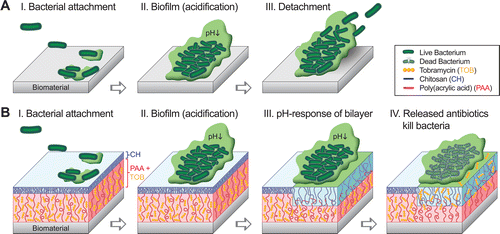Bioresponsive Nanofilms for Anti-Infective Biomaterials

Acquired infections are the most common cause of ICU deaths and are often caused by the endotracheal tubes and vascular and urinary catheters necessary for medical care of critically ill patients. The surfaces of these devices are prone to bacterial colonization because the devices commonly breach normal host infection barrier functions. Based on our longstanding interest in developing thin film surfaces to enhance biocompatibility of vascular biomaterials, we have developed a first generation smart bio-responsive modified poly (acrylic acid) (PAA)-chitosan (CH/PAA) grafted brush multilayer system that is i) resistant to bacterial adhesion and also ii) pH-sensitive for localized release of elutable antimicrobial drug to achieve microbicidal efficacy when, and where, bacteria, which normally acidify the surface, form biofilm. We are advancing this platform into new materials which alter surface nanomechanics a) so that bacterial adhesive strength is minimized; b) so that the drug loading and drug release profiles for microbicidal capacity at clinically desired levels are achieved; and c) so that chemically modified CH/PAA brushes grafted onto medically useful biomaterials produce clinically acceptable host inflammatory responses while limiting bacterial adhesion and growth in vivo.
